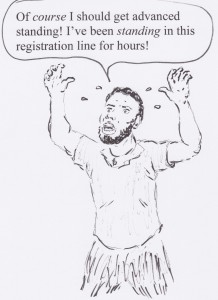Ancient apologetics
3 minutes: ancient apologetics. How Paul was able to use Jewish apologetic arguments when engaging with ancient intellectuals. Also apologetics vs. skepticism today. 3-minute video clip by Acts scholar Craig Keener. For 23 free lectures on Acts, see http://faculty.gordon.edu/hu/bi/ted_hildebrandt/DigitalCourses/00_DigitalBiblicalStudiesCourses.html#Acts_Keener
Jacob’s wives agree with his plan—Genesis 31:14-16
In Jacob’s culture, husbands held the final say. Further, God has spoken, and since Jacob has heard him, Jacob must do what God has commanded. Nevertheless, Jacob carefully presents the case to his wives. Jacob’s wives then weigh in as if he is consulting them in 31:14-16.
Why does Jacob consult them? On one level, he needs their support; he wishes to depart without Laban’s knowledge, and if his wives are not supportive it will be difficult to keep the secret from Laban.
Nevertheless, he presumably also values their support because they are his wives. This would fit a pattern in Genesis: the patriarchs often heeded their wives on matters that involved them (e.g., Gen 16:2; 21:12; 30:3-4, 9, 16). Although parents arranged marriages, even a future wife who was probably in her early teens might nevertheless be consulted on some details (24:5, 8, 57). Sometimes no consultation is mentioned, such as when decisions had to be made quickly (e.g., Gen 32:7-8, 22-23; 33:1-3). But the clearest exception to this pattern in Genesis contravened what God had spoken: the elder would serve the younger (25:22-23). Here Isaac favored Esau over Jacob, forcing Rebekah to resort to subterfuge (27:8-10), so Esau would serve Jacob (27:29, 37, 40). Yet Rebekah was the one who had heard from God in that case.
I am among those who find in the New Testament a countercultural call to mutual submission (Eph 5:21—6:9, esp. 5:21; 6:9). Nevertheless, even Christians who disagree with this reading of the New Testament would concur that the greatest is the servant (Matt 23:11; Luke 22:26), so that all of us are called to serve. Surely this should include, at the least, listening and seeking to build consensus wherever possible. After all, it is not only in war that decisions are made more safely after gathering the perspectives of different counselors (Prov 11:14; 15:22, 31; 20:18; 24:6; cf. 10:17; 18:13). Sometimes the way that seems obviously right to us is misinformed (Prov 14:12; 16:25; 21:2), requiring others’ input (12:15).
Today we do not live in a patriarchal culture. I believe that Genesis suggests, however, that even in a patriarchal culture, a husband is wise who consults his wife (or in Jacob’s case, his wives). In any culture, a work undertaken together is undertaken most effectively when undergirded with voluntary commitment.
(This continues a series of studies on Genesis; see e.g., deceiver; traveling; creation; fall.)
Evangelical means different things
Some writers in the media have identified evangelicals more as a political movement than a spiritual one, and demeaned evangelicals as blind followers of Donald Trump.
This is an unfair caricature, and for one thing grossly underestimates the movement’s diversity. I offer further thoughts in
http://www.huffingtonpost.com/craig-s-keener/evangelical-subculture-ve_b_9295550.html
Speeding to church? (cartoon)
Was Paul really a Roman citizen?–Acts 16:37
Paul’s Roman citizenship. 13.4-minute lecture by Acts scholar Craig Keener. For 23 free lectures on Acts, see http://faculty.gordon.edu/hu/bi/ted_hildebrandt/DigitalCourses/00_DigitalBiblicalStudiesCourses.html#Acts_Keener
Rachel’s death in childbirth—Genesis 35:16-20
I always hated scripts where somebody gets killed off and the writer gives you a petty reason not to feel too badly for them (I think of one movie where the victim was just vulgar, or another where she was just divorced, etc.). The very act of characterizing the person in some way makes them more identifiably human, and makes my heart go out to them more. (That may be one reason why I don’t watch many movies; when I do watch them I get into them too much.) Every life is precious, and most offenses are not capital (deathworthy) ones—or at least not any more than the sort that we all commit.
So in noting an irony or two surrounding Rachel’s death in Genesis, I am in no way suggesting that she merited her death. (By the time Genesis ends, everybody significant in the book except God has died anyway.) I am simply noting possible literary connections and trying to probe what they mean.
In 35:16-20, Rachel dies in childbirth. This person who dies in childbirth is the same person who earlier demanded of her husband, “Give me children or I will die!” (30:1). Possibly whatever biological issues that made it difficult for her to have children to begin with also led to her death in childbirth, though such death in childbirth was unfortunately common back then. But the narrative connection may also show us how important having children was to Rachel; she preferred death to not having children, and she ultimately did give her life in the process.
Another possible, though less clear connection, comes in ch. 31. Rachel steals her father’s teraphim, probably meaning idols and possibly connected with inheritance rights. Jacob, unaware that Rachel has stolen them, indignantly declares that if Laban finds his teraphim with anyone, that person would not live (31:32). In this case, therefore, Jacob deems this theft a potentially deathworthy offense. Concerned to avoid being detected as the thief, Rachel seats herself on her father’s teraphim, and avoids rising before her father by appealing to the “way of women” (31:35). This undoubtedly means menstruation; given ancient Near Eastern custom, Laban would not wish to touch her in this state, nor would he assume that in this condition she would be sitting on his gods!
But the language of women’s “way” might also evoke pregnancy. In her next pregnancy, Rachel would in fact die. The connection here is less clear, however, both because the “way of women” does not specify pregnancy and also because Rachel probably had recently already surrendered the teraphim when Jacob (presumably by now knowing of the theft) buried all the foreign gods among them (35:4).
A surer connection is simply an echo of the suffering attached to childbirth from the beginning. As Jacob had slaved in the fields for Laban (31:38-41), enduring the hard labor that became humanity’s lot after their inaugural disobedience (3:17-19), so Rachel died in the pangs of childbirth that had befallen humanity at the same time (3:16). That is, although we could identify some sins committed by Rachel or other characters in Genesis, we cannot assume that Rachel was more sinful than others or being punished for her personal sin. (We don’t read in Genesis about any painful death for Esau, for example.) As Jesus pointed out with regard to some recent particularly abrupt deaths, those victims were no worse than others, and all people will face a fate no less horrible if they do not repent (Luke 13:2-5).
What the irony may do is portend (for the hearer who knows the full story) and thus draw attention to her death, thereby increasing the pathos and inviting greater sympathy for this matriarch of Israel. Whatever the possible factors in her death, the account’s ancient Israelite audience would look on Rachel as the ancestor of two of their tribes (three if one counts Ephraim and Manasseh separately).
Clearly their ancestors in Genesis were imperfect humans, whether we think of Jacob or of Simeon and Levi or Judah. Yet God was with these imperfect people, and Rachel’s sacrifice helped make possible their existence as a people, thus qualifying her retroactively as a matriarch in Israel (cf. Ruth 4:11). This observation in turn reminded Genesis’s first audience, and reminds us as well, that God continues to work with imperfect people, so long as we are willing to be shaped by this perfect God. What God can make eternally of the sacrifices we offer in our often ordinary-looking lives is something that will be seen most fully from the vantage point of eternity. Yet God is trustworthy in making these offerings count as part of the larger story he is weaving in history.
(This study continues a series on Genesis. See e.g., God’s favor; Abraham’s promise; Babel.)
Advanced standing in seminary (cartoon)
One body, many gifts
Half-hour message on Romans 12
Christians for Biblical Equality recorded this message of mine in 2005 at their conference. I am amazed to see that I was bald even back then. 🙂
Preventing suicide, Acts 16:27-28
Paul prevents his jailer’s suicide in Acts 16:27-28, with background. 5 minutes by Acts scholar Craig Keener. For 23 free lectures on Acts, see http://faculty.gordon.edu/hu/bi/ted_hildebrandt/DigitalCourses/00_DigitalBiblicalStudiesCourses.html#Acts_Keener



